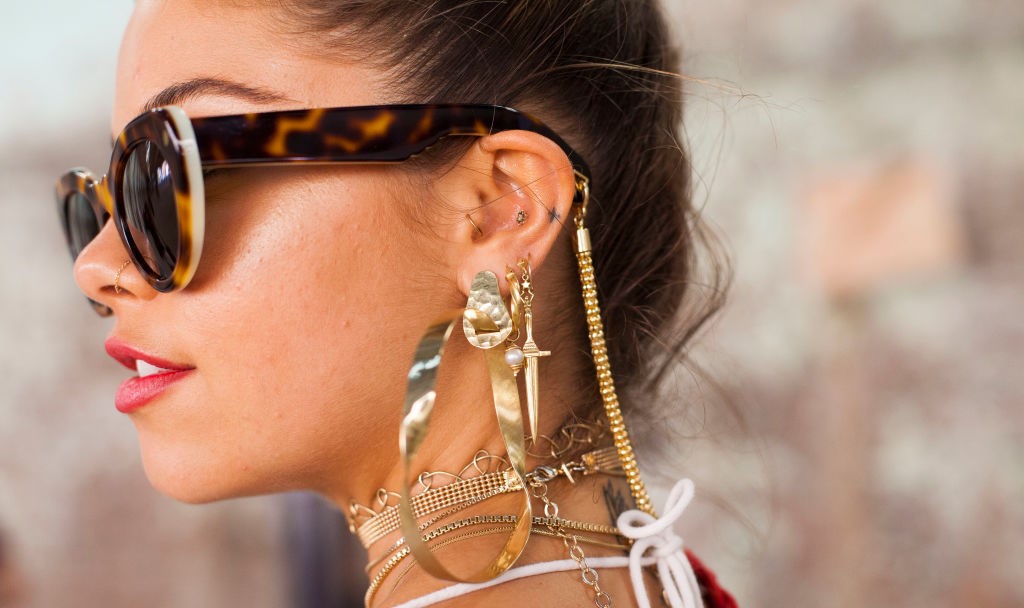How long do ear piercings take to heal?
From lobe to cartilage, the answer to "How long do ear piercings take to heal?" can differ with each piercing. Our guide is here to help

The healing process can be a frustrating part of getting your ears pierced—especially when you sleep on them at night (that kills). But don’t worry, if the ear piercing is looked after properly, the healing piercing can also be a breeze.
There are a variety of ear piercings available, from the trusty lobe to the more complex front-helix piercing. And whereabouts on the ear you have the piercing has an effect on the amount of time it takes to heal.
Our guide breaks down healing times for common piercings, and how to keep your fresh piercings clean and cared for.
A post shared by Metalia Piercing Studio (@metaliastudios)
A photo posted by on
- The key ear piercing trends for 2021 you need to know about
How long do ear piercings take to heal?
Earlobe piercings usually heal pretty quickly. They typically take around four to eight weeks to fully heal, whereas cartilage piercings can take longer. Unlike lobe piercings, cartilage piercings can take months to heal—from six months even up to a year for a helix or tragus piercing.
But taking a long time to heal doesn’t mean you’ll be in pain or unable to sleep on your favorite side for that entire amount of time. It’s merely the body healing a wound as it usually does. The first few weeks are the hardest.
Sreedhar Krishna, a consultant dermatologist, tells My Imperfect Life that the time taken for ear piercings to heal fully can vary "between individuals as well as where on the ear the piercing is."
"If the ear piercing becomes infected, then these periods can take a lot longer," says Krishna. "Additionally, certain medications can slow your body’s ability to ‘heal’, so if you’re on regular medication, please check with your doctor before having a piercing."
"As a dermatologist, I see lots of people for acne and prescribe Roaccutane. If you are on this medication, you should not have any piercings placed in the body, as these can fail to heal or possibly result in scarring."
Krisha also says that people of color should be extra careful with piercings. "Some have a tendency to develop keloid scarring, which can be incredibly difficult to treat. If people in your family have had issues, be careful."
A post shared by Maria Tash (@mariatash)
A photo posted by on
- Do ear piercings close over time? What to know
Ear piercing aftercare: What to do post-piercing
To heal the piercing site properly, there are some steps for you to take to ensure your piercing looks and feels beautiful.
Firstly, always (and we can’t stress this enough) listen to the advice of your piercer. And make sure they are qualified and professional, and that the ear is pierced with sanitary tools in a hygienic environment.
You also need to ensure that you’re not taking out or changing your jewelry too soon—at least, not until advised to by your piercer.
The main indicator of a piercing healing properly is a lack of pain and swelling and minimal redness. If your body is reacting badly to the piercing, you may experience throbbing pain around the pierced area, swelling, redness, itching, burning, or discharge around the site. These are signs that the piercing is infected. If any of these happen, you should see your doctor or piercer right away for advice, and check out our guide on how to treat an ear piercing infection.
Whether the piercing is infected or not, it’s important to clean it regularly and properly. If it is infected, you may be prescribed a course of antibiotics.
To keep the piercing clean, you need to wash your hands before touching your ears and wash your ear piercing twice a day with cotton wool and soapy or salty warm water. Dab it dry, and don’t pull at it. Refrain from playing with the jewelry until it is healed—you don’t want to aggravate the piercing side.
Of course, the main objective of a new piercing is to make it look as cute as ever. So focus on healing and keep it clean. And then enjoy choosing the best huggie earrings later on!
Hattie Gladwell is a freelance journalist who has written for Metro.co.uk, Cosmopolitan UK, LADBible, Grazia UK, The Independent, The Debrief and The Mighty. She is also a mental health advocate, and uses her Twitter following to raise awareness of mental illness.